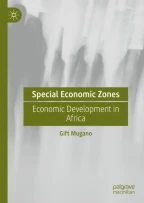Regulatory and Institutional Framework of Special Economic Zones

As part of the regulatory framework of SEZs, this chapter shows that both fiscal and non-fiscal incentives were widely used. In particular, international experience has shown that tax exemptions, streamlined processes, guaranteed electricity, water and free land have been used as effective incentives to lure investors into the zones.
This is a preview of subscription content, log in via an institution to check access.
Access this chapter
Subscribe and save
Springer+ Basic
€32.70 /Month
- Get 10 units per month
- Download Article/Chapter or eBook
- 1 Unit = 1 Article or 1 Chapter
- Cancel anytime
Buy Now
Price includes VAT (France)
eBook EUR 93.08 Price includes VAT (France)
Softcover Book EUR 116.04 Price includes VAT (France)
Hardcover Book EUR 116.04 Price includes VAT (France)
Tax calculation will be finalised at checkout
Purchases are for personal use only
References
- Aggarwal, A. (2004). Export Processing Zones in India: Analysis of the Export Performance (Working Paper No. 148). Indian Council for Research on International Economic Relations (ICRIER). Google Scholar
- Brautigam, D., & Xiaoyang, T. (2011). African Shenzhen: China’s Special Economic Zones in Africa. Modern African Studies, 49(1), 27–54. ArticleGoogle Scholar
- Cheesman, A. (2012). Special Economic Zones and Development: Geography and Linkages in the Indian EOU Scheme (Working Paper No. 145). Development Planning Unit, The Bartlett, University College London. Google Scholar
- Cheng, T. (2019). Special Economic Zones: A Catalyst for International Trade and Investment in Unsettling Times? The Journal of World Investment and Trade, 20(1), 32–67. ArticleGoogle Scholar
- Coppens, D. (2013). How Special Is the Special and Differential Treatment Under the SCM Agreement? A Legal and Normative Analysis of WTO Subsidy Disciplines on Developing Countries. World Trade Review, 12(1), 79–109. ArticleGoogle Scholar
- Defever, F., & Riaño, A. (2017). Subsidies with Export Share Requirements in China. Journal of Development Economics, 126, 33–51. ArticleGoogle Scholar
- Farole, T. (2011). Special Economic Zones in Africa: Comparing Performance and Learning from Global Experience. World Bank. BookGoogle Scholar
- FIAS. (2008). Special Economic Zones: Performance, Lessons Learned, and Implications for Zone Development. World Bank. Google Scholar
- Karambakuwa, R. T., Matekenya, W., Mishi, S., Jeke, L., & Ncwadi, R. M. (2020). Special Economic Zones and Transnational Zones as Tools for Southern Africa’s Growth: Lessons from International Best Practices (No. 2020/170). UN WIDER Working Paper. Google Scholar
- Kweka, J., & teVelde, D. (2020). Industrialisation and Industrial Hub: Experience in Kenya, Tanzania and Rwanda. In A. Oqubay & J. Lins (Eds.), The Oxford Handbook of Industrial Hubs and Economic Development. Oxford University Press. Google Scholar
- Tao, Y., Yuan, Y., & Li, M. (2016). Chinese Special Economic Zones: Lessons for Africa. Africa Economic Brief, 7(6), 1–11. Google Scholar
- UNCTAD. (2019). World Investment Report: Special Economic Zones. United Nations. Google Scholar
- UNDP. (2015). Comparative Study on Special Economic Zones in Africa and China. UNDP. Google Scholar
- UNECA. (2021). Harnessing the Potential of Special Economic Zones for Private Sector Development and Inclusive Industrialisation in Southern Africa. UNECA. Google Scholar
- World Bank. (2010). Chinese Investments in Special Economic Zones in Africa: Progress, Challenges, and Lessons Learned. World Bank. Google Scholar
- Zeng, D. Z. (2010). Building Engines for Growth and Competitiveness in China: Experience with Special Economic Zones and Industrial Clusters. World Bank. BookGoogle Scholar
- Zeng, D. Z. (2012a). SEZs in Africa: Putting the Cart in Front of Horse? World Bank. Google Scholar
- Zeng, D. Z. (2012b). An Overview of Six Economic Zones in Nigeria: Challenges and Opportunities (World Bank Policy Note). World Bank. Google Scholar
- Zeng, D. Z. (2015a). Global Experiences with Special Economic Zones – With a Focus on China and Africa. World Bank. BookGoogle Scholar
- Zeng, D. Z. (2015b). Global Experiences with Special Economic Zones: Focus on China and Africa (World Bank Policy Research Working Paper 7240). World Bank. BookGoogle Scholar
- Zeng, D. Z. (2016). Global Experiences of Special Economic Zones with Focus on China and Africa: Policy Insights. Journal of International Commerce, Economics and Policy, 7(3), 1–27. Google Scholar
- Zeng, D. Z. (2018). Special Economic Zones: Lessons from the Global Experience. World Bank. Google Scholar
Author information
Authors and Affiliations
- Department of Public Management and Economics Faculty of Management Sciences, Durban University of Technology, Durban, South Africa Gift Mugano
- Gift Mugano
You can also search for this author in PubMed Google Scholar
Rights and permissions
Copyright information
© 2021 The Author(s), under exclusive license to Springer Nature Switzerland AG
Cite this chapter
Mugano, G. (2021). Regulatory and Institutional Framework of Special Economic Zones. In: Special Economic Zones. Palgrave Macmillan, Cham. https://doi.org/10.1007/978-3-030-82311-5_3
Download citation
- DOI : https://doi.org/10.1007/978-3-030-82311-5_3
- Published : 06 November 2021
- Publisher Name : Palgrave Macmillan, Cham
- Print ISBN : 978-3-030-82310-8
- Online ISBN : 978-3-030-82311-5
- eBook Packages : Economics and FinanceEconomics and Finance (R0)
Share this chapter
Anyone you share the following link with will be able to read this content:
Get shareable link
Sorry, a shareable link is not currently available for this article.
Copy to clipboard
Provided by the Springer Nature SharedIt content-sharing initiative

